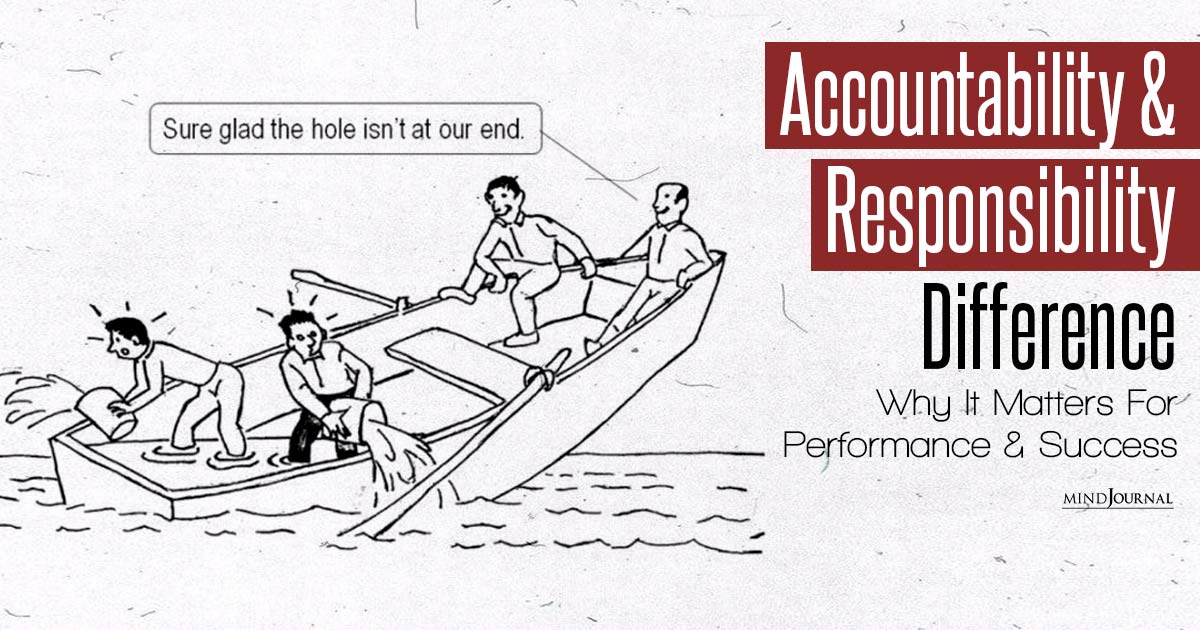Being accountable and responsible are two sides of the same coin. While they appear similar, these are not the same. Let’s explore accountability and responsibility difference.
As individuals, we often come across the terms “accountability” and “responsibility” in our daily lives. While the two terms may seem similar, they have distinct meanings that are often misunderstood or used interchangeably.
Understanding the difference between responsibility and accountability is crucial in both personal and professional settings. Let us delve into the nuances of accountability versus responsibility and highlight their key differences.
What is accountability?
Accountability refers to the obligation to answer for one’s actions or decisions. It involves taking ownership of one’s actions and accepting the consequences that come with them.
In essence, accountability is the act of being responsible for one’s actions or decisions, whether they result in success or failure.
In a professional setting, accountabilities are crucial for ensuring that individuals and organizations are held responsible for their actions. It allows for transparency, honesty, and trust to be established, which are essential for building strong relationships and maintaining a positive reputation.
Related: The 5 Qualities Of Emotionally Mature People
An accountable individual must answer for their behaviors and outcomes. An accountable person:
• Has to report to someone in a position of authority
• Must provide information about their performance
• Accepts praise or blame based on the outcomes
For example, a manager is accountable to their boss for the performance and development of their team. The manager has to regularly report on progress, results and issues. They also have to accept consequences – positive or negative – based on how well the team performed.
What is responsibility?
Responsibility, on the other hand, refers to the duties or tasks that one is expected to perform. It involves taking charge of a situation and ensuring that the necessary actions are taken to achieve a particular goal. Responsibility is often assigned to individuals based on their skills, knowledge, and expertise.

In a professional setting, responsibility is crucial for ensuring that tasks are completed efficiently and effectively. It allows for individuals to showcase their abilities and contribute to the overall success of the organization.
Responsibility means being answerable for duties and required actions. A responsible person:
• Owns duties that are part of their job or role
• Must complete tasks that have been assigned to them
• Has the authority to make decisions required to fulfill duties
For example, an employee is responsible for completing assigned tasks as part of their job. They are authorized to make decisions needed to get the work done. However, they are accountable to their manager for the quality and timeliness of their work.
Understanding what accountability and responsibility means is crucial for exploring accountability and responsibility difference.
Related: How To Take More Personal Responsibility and Stop Making Excuses
Accountability versus responsibility
So what is the accountability and responsibility difference? Now that we have established the groundwork, let us explore the difference between responsibility and accountability in personal and professional life –
1. Perspective and mindset
When exploring being accountable vs responsible, we need to consider one’s mindset and perspective.
At its core, accountability stems from an internal locus of control. It arises from a proactive mindset that seeks to take ownership of one’s actions and outcomes. Responsibility, on the other hand, often stems from external expectations or obligations assigned by others.
2. Ownership vs. execution
Accountabilities focuses on assuming ownership and taking proactive steps to meet expectations and deliver desired outcomes. It involves acknowledging the impact of one’s actions and decisions.
Responsibility, on the other hand, centers on executing assigned tasks and duties diligently and reliably, without necessarily taking ownership of the larger outcome.
3. Blame vs. response
Accountability entails acknowledging mistakes, accepting consequences, and actively seeking solutions. It emphasizes learning from failures and embracing growth opportunities.
Responsibility, while involving task completion, may not necessarily involve the same level of self-reflection, growth, or problem-solving. This is the difference between responsibility and accountability.
4. Empowerment and autonomy
Accountability empowers individuals to take control of their circumstances, make informed choices, and drive positive change. It fosters a sense of personal agency and autonomy.
Responsibility, while important, may not necessarily grant the same level of empowerment or autonomy, as it often operates within the framework of external expectations or obligations.
5. Proactive vs. reactive
Accountability thrives on proactivity, with individuals taking the initiative to fulfill their commitments and exceed expectations. It promotes a mindset that anticipates challenges and seeks to prevent issues before they arise.
Responsibility, although necessary, can sometimes adopt a more reactive stance, responding to assigned tasks as they emerge.
Related: 7 Steps To Create The Life You Actually Want
6. Outcome vs. task
Accountability focuses on the outcome of one’s actions or decisions, whereas responsibility focuses on the tasks that need to be completed to achieve a particular goal. This is a key accountability and responsibility difference.
7. Personal vs. assigned
Accountability is a personal obligation that individuals take on themselves, while responsibility is often assigned to individuals by their superiors or based on their role within an organization. This is the key for being accountable vs responsible.
8. Culture and organizational impact
Accountability forms the bedrock of a healthy and high-performing organizational culture. When individuals embrace accountability, it fosters trust, collaboration, and a shared commitment to excellence.
Responsibility, while vital, may not inherently contribute to the same cultural impact.
9. Personal growth and development
Accountability nurtures personal growth by encouraging introspection, self-improvement, and the continuous pursuit of excellence. It pushes individuals to learn from mistakes, seek feedback, and adapt their behavior accordingly.
Responsibility, while necessary for task completion, may not provide the same impetus for personal growth and development.
10. Influence and leadership
Accountabilities are often associated with effective leadership. When leaders embody accountability, they inspire their teams to take ownership, embrace challenges, and deliver exceptional results.
Responsibility, while important, does not inherently carry the same leadership qualities. This is another crucial accountability and responsibility difference.
11. Long-term success and achievement
Accountability sets the stage for long-term success and achievement. By taking ownership, individuals cultivate a results-oriented mindset and a drive for continuous improvement.
Responsibility, while crucial for day-to-day operations, may not necessarily contribute to the same level of sustained success. This is the difference between responsibility and accountability.
12. Integration and symbiosis
Ultimately, accountability and responsibility are not mutually exclusive; they are intricately intertwined. The most effective individuals and organizations find harmony by integrating accountability and responsibility.
When individuals assume responsibility for their assigned tasks and execute them with accountability, the stage is set for remarkable achievements and personal growth.
Related: 12 Things First-Time Leaders Need To Succeed
Key accountability and responsibility difference
Here are some key points that we must keep in mind when trying to explore the concept of being accountable vs responsible –
- Accountability involves justification and accepting consequences, while responsibility merely involves doing the assigned duties.
- Accountability focuses more on outcomes and results, while responsibility focuses more on completing tasks and processes.
- Responsibility can exist on its own, but accountability requires someone to be answerable to.
- Multiple people can share responsibility for a task, but only one person is ultimately accountable.
Relationship between accountability and responsibility
Now that we have explored being accountable vs responsible, let us find out some more about the relationship between them. Responsibility flows from accountability and vice versa. Here are two ways to view the relationship:
1. Top-down: Accountability leads to responsibility
When someone is held accountable, they are given the corresponding responsibilities. For example:
a. A manager is accountable for their team’s performance
The manager is then responsible for developing the team, allocating work properly, setting goals, coaching employees, etc.
b. An executive is accountable for the company’s growth
The executive is then responsible for making strategic decisions, setting the vision, hiring the right people, raising capital, etc.
2. Bottom-up: Responsibility leads to accountability
When duties and tasks are assigned, accountability automatically follows. For example:
a. An employee is responsible for completing assigned work
The employee is then accountable to their manager for completing the work on time and to a high standard.
b. A project team is responsible for delivering the project
The team is then accountable to stakeholders for delivering the project within budget and meeting specifications.
Those with responsibility must be accountable in some way – either to a supervisor, manager, executive, stakeholder or customer. Likewise, those who are held accountable are given the corresponding responsibilities and authorities to fulfill their duties.
Related: How to Reprogram Your Brain for Excellence
Accountability versus responsibility: Which is more important?
Now that we know the accountability and responsibility difference, which one is more significant for success?
While both accountabilities and responsibilities are important, they serve different purposes. Accountability involves taking ownership of one’s actions and decisions, while responsibility involves executing tasks or duties that are assigned to an individual. Both are essential for personal and professional success, and neither is more important than the other.
However, it is important to note that accountability is often a precursor to responsibility. Before an individual can be assigned responsibility, they must first be held accountable for their actions.
By taking ownership of their mistakes and learning from them, individuals can demonstrate their readiness for greater responsibility.

Importance of understanding accountability and responsibility difference
Understanding the difference between accountability and responsibility is crucial for several reasons. Here are some of the main reasons why it is essential to distinguish between the two concepts:
1. Drives success
Both accountability and responsibility are crucial for driving success. Accountability ensures that individuals are held responsible for their actions and decisions, which promotes transparency and honesty.
Responsibility ensures that tasks are completed efficiently and effectively, which contributes to the overall success of the organization.
2. Builds trust
Building trust is essential for establishing positive relationships in both personal and professional settings. Accountability and responsibility promote transparency and honesty, which are essential for building trust between individuals and organizations.
3. Promotes personal growth
Taking ownership of one’s actions and decisions is crucial for personal growth and development. Accountability promotes self-reflection and learning from mistakes, which helps individuals grow and improve.
4. Ensures compliance
Compliance is crucial for ensuring that organizations operate within legal and ethical boundaries. Accountability and responsibility ensure that individuals and organizations are held responsible for complying with regulations and laws.
Related: 3 Easy Steps To Achieving Your Goals According To Science
Takeaway
While accountability and responsibility are closely linked, there are key differences in focus, consequences and outcomes. Both accountability and responsibility drive better performance, so leaders must make sure people know exactly what they are accountable and responsible for.
Gaining knowledge about accountability versus responsibility can propel us toward greatness, and help unlock our full potential and positively impact those around us.










Leave a Reply